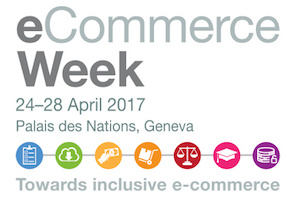Inclusive development and e-commerce: Case of China
24 Apr 2017 02:00h
Event report
The session was introduced by H.E. Ms Anusha Rahman Ahmad Khan, Minister of State for Information Technology and Telecom, Pakistan. She started by highlighting the benefits of e-commerce to economic growth, job creation, market expansion and the empowerment of women. She highlighted the importance of the case study ‘Inclusive growth and e-commerce: China’s experience’, prepared by AliResearch, which provides an overview of China’s experience on deploying e-commerce, its impact on development, and the lessons learned that could help other developing countries.
Mr Hongbing Gao, Director of AliResearch and Vice President of Alibaba Group, mentioned that e-commerce provides new conditions for global development, as it benefits small companies. Technology has created an opportunity for innovative models, such as the Taobao villages, connected rural areas that have morphed into specialised manufacturers. Owing to the Taobao online marketplace, those villages can now export to the rest of China (as well as abroad in some cases). In a poor area such as the Jiangsu province for instance, Taobao helps farmers to conveniently buy cheaper goods. E-commerce creates employment by supporting micro-entreprises, as well as by creating opportunities for some vulnerable groups, such as the disabled, women, and young people, to become entrepreneurs. On the policy level, the Electronic World Trade Platform (eWTP) aims to promote the inclusive growth of e-commerce.
Ms Marion Jansen, Chief Economist, International Trade Centre (ITC), started by explaining the mission of the ITC, a joint UN-WTO agency based in Geneva, which aims to make trade happen by providing technical assistance, with focus on developing countries. Currently, e-commerce accounts for 12% of trade in goods globally, and it also helps achieve the sustainable development goals and reduce poverty. It does so by closing gender gaps, promoting job creation, innovation, and fostering the deployment of infrastructure, such as e-payment systems. It does not only contribute to trade, but makes trade different: e-commerce lowers the barriers of entry and is less concentrated on traditional players.
Jansen remarked, however, that some barriers still remain, such as difficulties in establishing businesses online, taking part in the international e-payments system, issues with the cross-border delivery and the after-sales relationship with costumers. Divides in information and communications technology (ICT) adoption also exist between small and large enterprises, and the difference is particularly striking in sub-Saharan Africa. There is still a divide when it comes to gender, women are still less active online. The ITC produced a report called ‘Bringing SMEs onto the e-Commerce Highway’, which highlights the elements that need to be in place for e-commerce to run smoothly for SMEs, providing a toolkit for policy makers. She mentioned that the ITC also provides capacity building, such as the course, ‘E-commerce for SMEs: an introduction for policy makers’, developed in partnership with DiploFoundation, and a course on Digital Commerce, which is being developed with DiploFoundation, CUTS and UNCTAD, and will be launched at the E-commerce week.
Ms Shamika N. Sirimanne, Director of the Division on Technology and Logistics, UNCTAD, highlighted that fact that UNCTAD works on the intersection between trade and development, producing measurement and capacity development. The case study by AliResearch is important because it positively shows what can be done.
Mr Peixiao Jia, a former farmer and currently a Chinese entrepreneur, shared the story of how he became successful with e-commerce.
Mr Kibyoung Kim, Director of the Global e-government division of the Ministry of the Interior of the Republic of Korea, started by questioning the replicability of the Alibaba model. Each country is different and needs to find its model. He shared Korea’s experience in fostering economically self-sufficient rural communities of farmers or finishing villages, through e-commerce. Information Network Villages were created and are being expanded into the mobile environment and the cloud.
Khan closed the session by saying that the ICT Infrastructure is the bedrock for any area in the information society, from agriculture to commerce and security. Telecom providers made a contribution to governmental funds, which are being used to connect the unconnected in Pakistan and the goal is to connect small villages and have a broadband penetration by 2020.
Related topics
Related event

